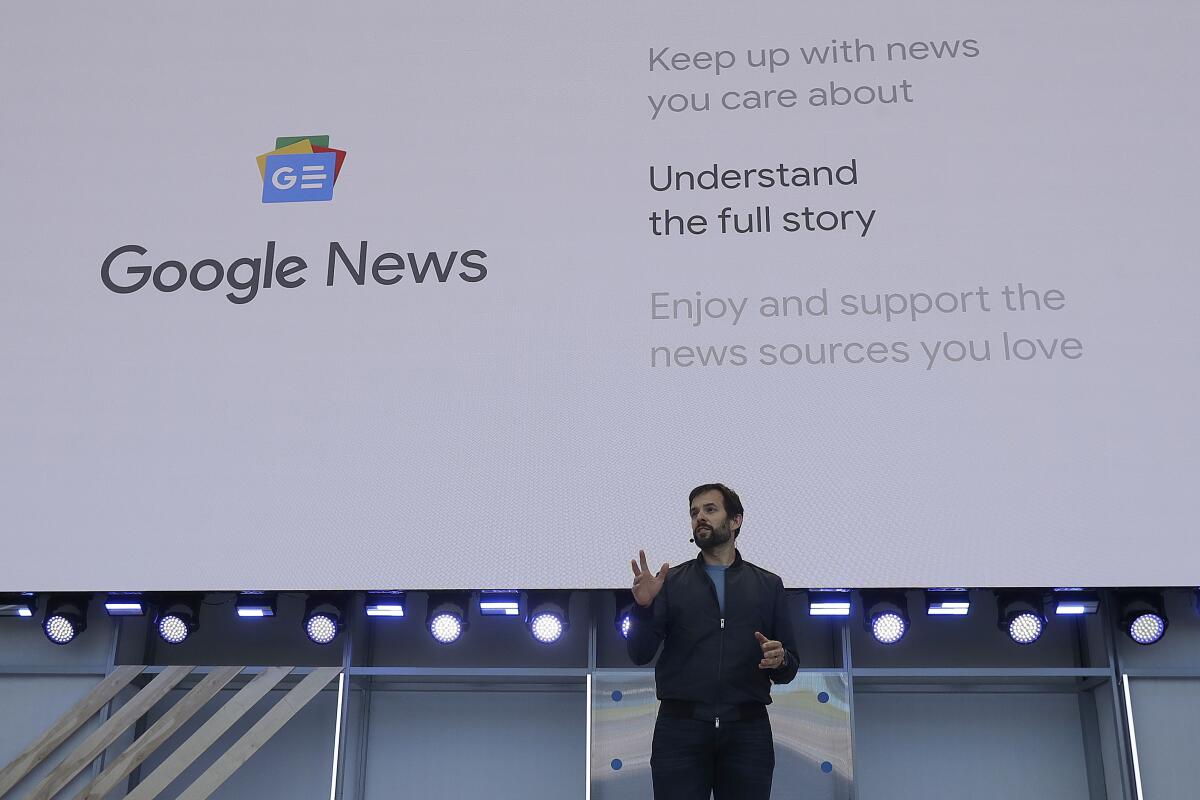Deal reached in feud between California news outlets and Google: $250 million to support journalism but no new law

- Share via
SACRAMENTO — California lawmakers intend to shelve legislation that would have required Google to pay news outlets for distributing their content, and in its place announced on Wednesday a new public-private partnership between the state and the tech giant that will fund programs to research artificial intelligence and bolster local journalism.
The plan lays out a commitment of nearly $250 million over the next five years, with just over one-fourth of the money coming from state taxpayers and the remainder coming from Google and possibly other private donors. The money will go toward two new initiatives administered by UC Berkeley’s Graduate School of Journalism: a fund to distribute millions of dollars to California news outlets, and an “AI accelerator” to develop ways for journalists to use the powerful technology.
“This agreement represents a major breakthrough in ensuring the survival of newsrooms and bolstering local journalism across California — leveraging substantial tech industry resources without imposing new taxes on Californians,” Gov. Gavin Newsom said in a statement. “The deal not only provides funding to support hundreds of new journalists, but helps rebuild a robust and dynamic California press corps for years to come, reinforcing the vital role of journalism in our democracy.”
The agreement marks the culmination of a two-year battle between the news industry and the tech sector over how to resuscitate local journalism amid massive upheavals in how people consume news and how advertisers reach consumers.
Assemblymember Buffy Wicks (D-Oakland) led the effort, arguing that supporting California journalism is essential to maintaining democracy because local news outlets play a vital role informing the public about their government. Dwindling advertising revenue has caused many media companies to lay off journalists, or shutter entirely, leaving some communities without the independent watchdogs that local news outlets provide.
Years after the death of its newspaper, Richmond’s primary source of local news is a website funded by Chevron, the oil giant whose refinery looms over the city’s horizon.
“This partnership represents a cross-sector commitment to supporting a free and vibrant press, empowering local news outlets up and down the state to continue in their essential work,” Wicks said in a statement. “This is just the beginning. I remain committed to finding even more ways to support journalism in our state for years to come.”
The debate over how to solve the problem fractured the news industry, with traditional publishers getting behind a bill that digital news outlets initially did not support, and the union that represents reporters turning against the negotiated compromise. Politicians found themselves squeezed between the divided journalism community and the powerful tech sector, a major contributor to California’s economy.
And Democratic lawmakers themselves were divided, with state Senate leader Mike McGuire (D-Healdsburg) saying the agreement “doesn’t fully address the inequities facing the [news] industry.”
As part of the agreement, the state will put $30 million from next year’s budget into the fund, and contribute $10 million in each of the next four years. Google will put $15 million into the fund next year, and pay another $15 million next year to support other journalism initiatives: $5 million for the AI accelerator and $10 million in direct donations to digital news outlets. In each of the next four years, Google commitments include putting $10 million into the new fund and continuing $10 million in direct donations to news outlets. Money in the fund will be distributed to California newsrooms based on how many full-time journalists they employ. A new nonprofit organization will be formed to administer the programs at UC Berkeley, with a board made up of representatives from across California’s industry.
“This public-private partnership builds on our long history of working with journalism and the local news ecosystem in our home state, while developing a national center of excellence on AI policy,” said a statement from Kent Walker, chief legal officer for Alphabet, the parent company of Google.
Many news outlets are already dealing with declining revenue from digital ads and subscriptions. Now, their business models are poised to be disrupted again by AI.
The agreement has support from several professional associations, including the California News Publishers Assn. that the Los Angeles Times belongs to and the Local Independent Online News Publishers group that initially opposed Wicks’ bill. The labor union that represents journalists supported her bill but opposes the deal.
Matt Pearce, president of the Media Guild of the West, criticized the plan in emails with union members in recent days, calling it a “total rout of the state’s attempts to check Google’s stranglehold over our newsrooms.”
The union had lobbied for the deal to include a provision requiring media companies that receive the funds to have a non-expired collective bargaining agreement, and for Google to contribute more than the $74 million it pays annually to newsrooms in Canada. The agreement does not include a labor provision and Google comes out paying less to California newsrooms than it does in Canada. Pearce criticized it as a “secret deal” that was worked out behind closed doors.
As part of the agreement, Wicks agreed to set aside legislation she’s championed for the last two years.
Assembly Bill 886 also, known as the California Journalism Preservation Act, sought to blunt the financial hardships that have hit the news business as Google and Meta grew to dominate digital advertising, and technology radically changed the way people consume news. Sponsored by the California News Publishers Assn., of which the Los Angeles Times is a member, the bill set off a fierce battle between news organizations and Big Tech.
Publishers argue that online search and social media platforms are unfairly gobbling up advertising revenue while publishing content they don’t pay for. The bill would have required Google to pay into a fund that would in turn distribute millions of dollars to California news outlets based on how many journalists they employ. The amount of the payment was never spelled out in legislation, though lawmakers were hopeful that Google and the news industry could negotiate an agreement.
But Google argued in testimony before the Legislature earlier this summer that the bill would “break the fundamental and foundational principles of the open internet, forcing platforms to pay publishers for sending valuable free traffic to them.”
Google threatened to remove California news content from its platform if the bill passed, and then ran ads saying the legislation would reduce Californians’ access to news.
Lobbying over the bill grew intense, with a trade association Google belongs to launching an ad campaign aimed at lawmakers that cast the legislation as a giveaway to large media corporations. Records show the Computer and Communications Industry Assn. spent $5 million on ads against AB 886 over the last two years as the bill made its way through the Legislature.
The most recent version of the bill was modeled after similar legislation in Canada, where Google is paying $74 million annually into a fund. California’s bill would have been the first such law in the United States.
California is trying to force Big Tech to pay for news. What can we learn from Australia and Canada?
Three years ago, when Australian politicians took on the titans of Big Tech — crafting legislation to force Google and Facebook to pay for news articles they share on their sites — Google threatened to pull out of the country.
Lawmakers this year also considered a different bill that sought to aid the news industry by providing a tax credit for employing full-time journalists. Senate Bill 1327 would impose a new tax on Amazon, Meta and Google for the data they take from users and pump the money from this “data extraction mitigation fee” into tax credits for news outlets.
As a tax measure, it required approval from two-thirds of the Legislature, presenting a political challenge in an election year.
Its author, Sen. Steve Glazer (D-Orinda), supported Wicks’ legislation as it moved through the Capitol but said he is against the new plan that’s taken its place.
“Despite the good intentions of the parties involved, this proposal does not provide sufficient resources,” Glazer said, criticizing the lack of involvement of other companies, such as Meta.
“This agreement, unfortunately, seriously undercuts our work towards a long-term solution to rescue independent journalism.”
More to Read
Sign up for Essential California
The most important California stories and recommendations in your inbox every morning.
You may occasionally receive promotional content from the Los Angeles Times.














